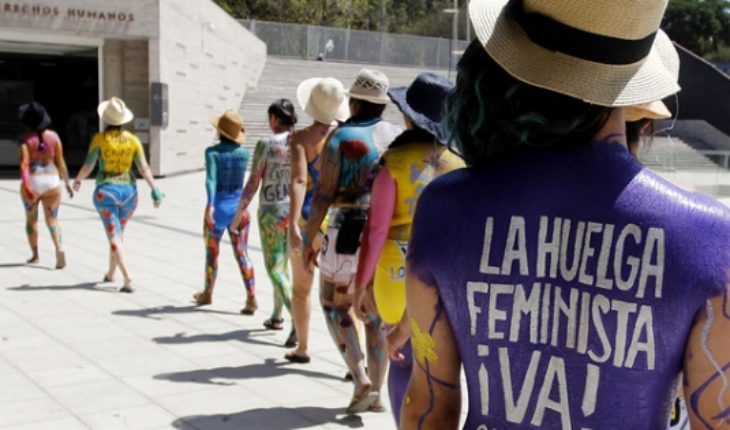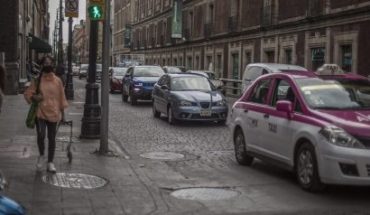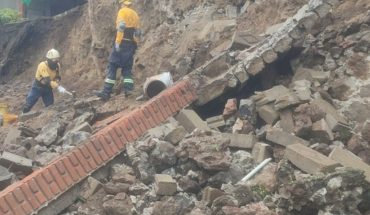Painted bodies, deployment of canvases, name change to historical sites and the metro stations; assemblies open squares, shots of buildings, a special for cell phones and up to eleven family in Parque Bustamante application, are some of the initiatives that were carried out during one of the key weeks for the fourth wave feminist. A week that went with the Super Monday feminist and seeking put the finishing touch with more than 40 marches throughout the country, also for the first call for general strike of women, to commemorate the day of working women This 8 March.
Mobilization organized by the Coordinator 8M, which carries nearly a year of preparation and invited more than 1,500 women to the “meeting plurinational of women’s struggle” made in December of last year, which set the guidelines for the program of this 8M. ten demands that include “end to political, sexual and economic violence”, “decent work”, right to free abortion, a new law on migration, new media gender law, among others.
A day of agitation and protest at the national level which has a particular action has been strongly challenged by the Government: the domestic labor strike of women. “The revolution will be feminist, will be domestic or will not be,” said journalist Mónica Rincón in one of his columns on the 8 M. A phrase that few manage to understand and that has been challenged in social networking and a host of radio and television panels. But, according to the sectoral mouthpieces for the Coordinator 8M, domestic work, or “sit-down” unemployment at home, is based on the strike call for Friday.
The domestic revolution historian Alejandra Araya says that demands for sexual and reproductive rights have been instrumental, as discussion by free abortion and the right to decide, also for a life free of abuse and harassment to women, to the that joins the demand by recognizing a fundamental role of women in domestic work, “a work that allows the reproduction of life”.
“The double working day is still real, care, domesticity is still in charge of the women.” If a woman does not, a man does not”, highlights the academic of the University of Chile. A reality that is made palpable every day. “They send you to bed because you’re the girl of the House, to take care of the young brothers and have prepared food, but no one asks you if you want to do that,” highlights Alejandra Araya.
It is this role of working women at home and in the salaried work which seeks to relieve the call to strike for the 8 M. Historian stresses that this role is transferred to the traditional work and that, when “a job is feminized, lost value in the market”. “When a man dedicates to the kitchen is chef, when women do so are cooks.” Nursery school work and social were feminized and more formal studies States that when it is feminized profession it is because it has desvalorado that work, resulting in wage differentials. Then, everything is bound”.
However, for the historian “the struggle against capital does not eliminate the inequality we have at birth between men and women, because still the Civil Code of the 19th century”, which determines the way in which the woman takes place in society marriage and inheritance law. “That is what defines the real and specific situation of women,” details.
Daniela López, Director of node XXI Foundation, explains that “the feminist movement understands what means inequality in all its complexity and speaks of the work beyond the employee, includes all work which is invisible in the houses, in the” domestic. This work constitutes the women as political subjects”. Stresses that “women are the main breeders of labour, therefore, the State and the Catholic Church have always sought to control sexuality and reproduction of women”.
Feminist lawyer adds that the strike has been used mainly among the movements of women workers, but that the “selective tradition” of history has made invisible “the role of women in the labor movement, but the woman has been protagonist of” the struggle for work”. Remember that, prior to the Russian Revolution, “women went on strike in textile factories, they called the struggle for bread, they are the first to mobilize”. In Iceland, in 1975, “90% of the women comes to a strike to make visible the domestic work burden of feminine and sue the sex discrimination and equal pay”, it emphasizes.
The analyst added that the feminist movement was strengthened “when display the feminization of work, its sexual division” and is aware that the work of caring for the sons and daughters, elders, family sick, “the cares of life and” services are intended only for women, and are functions that are more precarized producers with neoliberalism, deepened with the emergence of retail, call centers and outsourcing.”
It is for this reason that the call for mobilization on Friday also would be to that men occupy this role in the home, that women can exercise the strike in his work and at the same time at home. In addition, also called has made not to buy in retail and supermarkets, reason so in different cities have been deployed canvases and manifested in malls.
“It is important to make a call to participate, not to be afraid, the breadth of the program accommodates everyone,” highlights the spokesperson of Education Coordinator 8 M, Rosario Olivares. The Professor added that the organizers are looking for “provide security to women in the marches, and there is an alternative of having care spaces for children and girls in trade unions and other houses near the Mall offices”.
In addition, the March, in your home, will be composed of only women and each block, organized on the basis of the feminist agenda, determined if its composition is mixed. “They have blocks territory, social, Trade Union, education, communications, among others”, says the spokeswoman for Coordinator 8 M, and stressed that “there is a spirit and hope that the March will be massive and we are going to feel safe”.
A fight population one of the main criticisms to the feminist movement has been the gentrification of the movement, centred in the universities and among young professionals. It has also been criticized for its “politicization”, moreover, the Government stressed that the call for a general strike for the 8 M was a strategy of opposition parties.
From the Coordinator 8M said in a statement that these criticisms reveal the ‘ disconnection with the problems and concerns affecting us (…). ” Women’s issues cannot nor should be limited to eradicate violence against women understood only as harassment, abuse, blows and femicide.”
On the other hand, Daniela Sáez, territorial spokesperson of the Metropolitan coordinating Region 8M, poses that this is not a centralized movement, and that “women in the territories we sit the call to strike”. Stresses that in its zonal cultural squares, were made “to intervene a territory, in specific with crafts, workshops and on violence”. Moreover, the day of the Super Monday feminist began with intervention and Court streets of women settlers, who arrived to La Moneda to protest for decent housing.
Saez is part of the movement of people and Pobladoras in Lucha (MPL) and points out that one of the programmatic axes is “the human and constitutional right to access to housing, the right to the city and occupy the spaces (…) This demand comes from the inhabitants more organized on the issue of housing”. Spokeswoman explains that they seek to ensure the right to soil, which “is not regulated by the market”, which excludes the settlers.
Also note that the mobilization of the inhabitants has been a complex path, as in other sectors. “There is much machismo, patriarchy across all our organizations, it is a process that has a history of woman and it’s time that women move to the front, to spearhead demands, to lead the fights. “We take care always, 90% of House committees are composed by women and those who lead it usually are men”, indicates.
For the landowner, it is important to note that found women “a historic role imposed, take care of the House and home, and the men have brought privileges from this and there it intersects the feminist demands. We are that are going to the marches, to barricade, carries children up and down, but those who take the vocerias are men, and that is an injustice”.
Resistance international and the world worker other shafts which discusses this call to March 8 is the social security and equality in paid work, is for this reason that within the program raised by the Coordinator 8 M also is It is “Work decent, stable and safe”, including the demands for No+AFP.
Moreen Ramos, spokeswoman for labour and social security of the coordinating 8M, which includes 30 trade unions and workers, emphasizes that this demand “establishes the equality of conditions of work for men and women, non-discrimination at the time giving works “, eradicate excess in the workday, the end of the labour and sexual harassment in the workplace and equal pay and rights.
“We don’t want to live with fear before the structural violence of the pmiserable ensiones, unemployment, health and the right to housing. “Contemplate a system of care that is unique in the care of children and sick, are the women that take care of that job is not remunerated, or socially recognized”, details.
Ramos explains that it is a direct questioning workers and unions, “the idea is to organize and train a force together among workers, which unions take charge of the demands that we are lifting ourselves”. It is for this reason that struck the vagueness of the single Confederation of workers of Colombia (CUT) before the call to strike for this 8 March.
The spokeswoman for the Coordinator 8M says that as an organization had “meetings with responsible for the Vice-Presidency of the gender of the CUT, but did not make a pronouncement clear to call effective unemployment, single was called to join the activities of the strike”.
Amalia Pereira, Vice-President of the CUT, explained that the Executive Committee of the Board Social, that integrates the Central, the Anef, the Coordinator No+AFP, the Feusach, Fech, Feuc and motion brand AC, convened in addition to all forms of mobilization and protest that is they can express in the context of the feminist General strike. “We support the activities of 8 March and the feminist strike goes. We call upon all organizations to make stops and all forms of mobilization. Subsidiaries (in the CUT) will be added to all activities along Chile”, said Pereira.
A different picture which called the Confederation of Municipal Health (Confusam). “We call on citizens to refrain from going to clinics, to the Cesfam this Friday, since we will be folded and folded all officials and civil servants to cash unemployment”, said the national leader of Confusam, Carolina Espinoza.
But Chile is not the only country where trade unions have not openly called to become part of the General strike of the 8 M. It should be noted that this form of mobilization has been driven in other countries, the Spanish feminist movement summoned a strike the year 2018, and this year in Turkey and the United Kingdom also has been promoted this form of mobilization. Germany pressure that unions are plegaran to call of the strike also was controversial, but they finally joined, although trade unions in Austria did not give up before local feminist movements.
In Argentina, mobilization for this 8M has focused on the fight for reproductive rights, the end of femicides and the motto ‘girls not mothers’. In Nicaragua, there is a totally different reality, feminist organizations have reported that the Government of Daniel Ortega has contained all the mobilizations and chased the women organized.
translated from Spanish: Since the strike of domestic work until the population fight: the new face of the Chilean 8M
March 7, 2019 |





